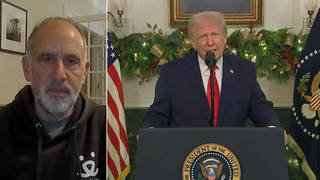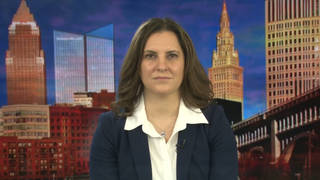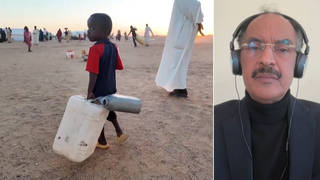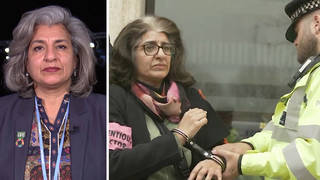
Guests
- Kevin Andersondeputy director of the Tyndall Centre for Climate Change Research at the University of Manchester in Britain.
Ahead of the U.N. climate change summit in Paris, France, more than 180 nations pledged to voluntarily reduce greenhouse gas emissions, but many climate justice groups say far more needs to be done to keep global warming in check. We speak with one of the world’s leading climate scientists who has come to the Paris talks with a shocking message: The climate crisis is more severe than even many scientists have acknowledged. Kevin Anderson is deputy director of the Tyndall Centre for Climate Change Research and professor of energy and climate change at the University of Manchester in Britain. He has said many scientists are self-censoring their work to downplay the severity of the climate crisis.
Transcript
AMY GOODMAN: This is Democracy Now!, democracynow.org, The War and Peace Report. I’m Amy Goodman. We’re broadcasting from the U.N. climate summit, the COP21 here in Paris, France. Ahead of the talks, more than 180 nations pledged to voluntarily reduce greenhouse gas emissions, but many climate justice groups say far more needs to be done to keep global warming in check.
We’re joined now by one of the world’s leading climate scientists who has come to the Paris talks with a shocking message: The climate crisis is more severe than even many scientists have acknowledged. Kevin Anderson is deputy director of the Tyndall Centre for Climate Change Research and professor of energy and climate change at the University of Manchester in Britain. He said many scientists are self-censoring their own work to downplay the severity of the climate crisis. Dr. Anderson recently wrote, quote, “Yet so far we simply have not been prepared to accept the revolutionary implications of our own findings, and even when we do we are reluctant to voice such thoughts openly, many are ultimately choosing to censor their own research.”
Kevin Anderson, welcome back to Democracy Now! It’s great to have you with us.
KEVIN ANDERSON: It’s nice to be here.
AMY GOODMAN: You came in from Britain?
KEVIN ANDERSON: Yes, I did. Yes.
AMY GOODMAN: How did you get here?
KEVIN ANDERSON: By train. I always travel by train or ship.
AMY GOODMAN: I remember when we were in Copenhagen, you refused to fly.
KEVIN ANDERSON: Yeah, I haven’t flown for 11 years. Yeah.
AMY GOODMAN: Why?
KEVIN ANDERSON: Because I think it’s really important that those of us who think climate change is an essential, pivotal issue for modern society demonstrate that we can lead good lives, we can carry out our jobs, without having very high carbon footprints. So whilst the emissions from my particular activities aren’t quite so important—I’m just one person—the sort of symbolic message that it sends is actually very important. And it’s already sort of engendered a different attitude amongst some of the academic colleagues, who now also take a similar approach. They try to avoid flying wherever they reasonably can. And sometimes that can make things quite difficult, but we have to—we have to make that sort of effort.
AMY GOODMAN: So why are you here?
KEVIN ANDERSON: I’m here because there’s a, I think, very important scientific message still to be made and to be related to not just the policymakers and the people here, but also to wider society, to the civil society groups, to the NGOs, but, I mean, even, of course, for us to discuss amongst the scientists that are here, as well.
AMY GOODMAN: And what is that message?
KEVIN ANDERSON: The message is that the voluntary submissions that have been put forward by all of the countries, when you add all of these up, they are far, far above the level of what we call dangerous climate change, that all of our leaders have committed to, to avoid going above this 2 degrees C rise, I think about 3.6 degrees Fahrenheit. But actually, when you add up all of the commitments that the countries are making in terms of their reductions in emissions, then actually it’s far, far above that, nearer 3 or 4 degrees C temperature rise, which is a huge increase. That’s a global average. Remember, that is a global average. And most of the globe is covered in water, so on land that’s an average of, if we carry on like we’re going now, 4, 5, possibly even as high as 6 degrees C temperature rise.
AMY GOODMAN: So what does that look like on the ground?
KEVIN ANDERSON: If we saw those sorts of changes, we’d see dramatic reductions in the staple food crops. So that’s a really big issue, if we have big 40 percent or so reductions in rice, maize, wheat, sorghum, those sorts of crops. Huge changes in sea level rise by the end of the century, but also locking in very large sea level rise changes going forward beyond that. And we’d see increase in droughts and in flooding, increase in severity of typhoons in the Southern Hemisphere. So, really, a lot of the—you know, we have all learned to live with the weather that we’ve had. And actually, what we’d be seeing are significant increases in the extremes around the planet, so we’d all suffer very significantly from a 4 degrees C temperature rise.
AMY GOODMAN: You have said that scientists, climate scientists, are self-censoring. What are they saying?
KEVIN ANDERSON: Well, those of us who look at the—running between the science and then translating that into what that means for policymakers, what we are afraid of doing is putting forward analysis that questions the sort of economic paradigm, the economic way that we run society today. So, we think—actually, we don’t question that. So what we do is we fine-tune our analysis so it fits within a sort of a—the political and economic framing of society, the current political and economic framing. So we don’t really say that—actually, our science now asks fundamental questions about this idea of economic growth in the short term, and we’re very reluctant to say that. In fact, the funding bodies often are reluctant to fund research that raises those questions. So the whole setup, not just the scientists, the research community around it that funds the research, the journalists, events like this, we’re all being—we’re all deliberately being slightly sort of self-delusional. We all know the situation is much more severe than we’re prepared to voice openly. And we all know this. So it is a—this is a collective sort of façade, a mask that we have.
AMY GOODMAN: Well, let’s just talk about the headlines today.
KEVIN ANDERSON: OK.
AMY GOODMAN: On Democracy Now!, we talked about Beijing issuing its first-ever red alert for air pollution, as China’s capital city is engulfed in thick smog rife with poisonous chemicals that can make residents sick from simply stepping outside. This isn’t because there’s some catastrophic meltdown at a coal plant or some factory.
KEVIN ANDERSON: No.
AMY GOODMAN: This is just daily life in Beijing.
KEVIN ANDERSON: Yes, and that’s because the sorts of power that they’re using in Beijing, and lots of it is being generated in Beijing, and the cars, as well, are there running in Beijing, they’re not running cleanly. So they’re putting lots of very nasty pollutants in the atmosphere. They’re also obviously putting a lot of greenhouse gases into the atmosphere, as well. So it’s both then a local air pollution issue and a real issue for climate change. And to the Chinese’ credit, they are significantly trying to reduce the amount of local air pollution in their cities, because they know it has a big health impact, they know it has a big economic impact. So the Chinese are moving in the right direction, but nowhere near fast enough for us to avoid this 2 degrees C temperature rise.
AMY GOODMAN: And then you have what’s happening in England right now, in Cumbria. You have in Norway, for example—
KEVIN ANDERSON: Yeah.
AMY GOODMAN: —an absolute crisis—
KEVIN ANDERSON: Yeah.
AMY GOODMAN: —that they’re saying they’re seeing problems like they haven’t seen in a hundred years.
KEVIN ANDERSON: Yeah, and, again, in India. There’s some big floods in India, as well. So we are seeing—we are seeing lots of extreme weather events. Now, it is always—we have to be very careful as scientists. Scientists are always slightly annoyingly conservative here. We cannot say that any one of these events is a climate change event. But we can say that our climate change science and analysis makes it very clear that the sorts of things that we’re doing in terms of emitting carbon dioxide into the atmosphere means we will see more of these sorts of events and increased severity of these events, as well. So these are indicative of exactly what we would expect to see.
AMY GOODMAN: Can you talk about what we consume in the United States, what you consume in Britain, compared with what is consumed in other parts of the world?
KEVIN ANDERSON: Well, when we think about carbon dioxide emissions, which is basically how much fossil fuel we’re burning, 50 percent of the global carbon dioxide emissions from our burning of fossil fuels comes from just 10 percent of the population. So it’s quite a small percent of the population are responsible for the lion’s share of the emissions. And if you sort of dig down a little bit deeper than that, you find some even more disturbing figures—that the top 1 percent in the U.S., they emit two-and-a-half thousand times more—two-and-a-half thousand times more—than the bottom 1 percent globally. So there’s a huge difference between who is responsible for the CO2 emissions, the carbon dioxide in the atmosphere, and therefore the climate change that we are beginning to witness now. And I think when we think about this in terms of what we need to do in terms of policy, this is not about everyone in the world making big reductions in their energy consumption. It’s about those of us who are responsible for the lion’s share of the emissions making those big changes.
AMY GOODMAN: Compare what Americans consume and what Europeans consume.
KEVIN ANDERSON: Well, the Americans are roughly twice as much as a typical European. So, you know—and really, your quality of life is—when we look at all the indices for a pure quality of life, the quality of life of a typical American is no better than the quality of life for a typical European. But your cars are much heavier and bigger. Your refrigerators are bigger. I mean, I think sort of bigness probably captures the difference between the U.S. and the EU. So, you know, I think—so, the Americans could live just as good a quality of life as they do today, and they could probably do almost all the things that they do today and significantly reduce their emissions down to sort of the EU level. Now, that would not be enough for us to avoid dangerous climate change, but it would be a huge step in the right direction.
AMY GOODMAN: What do you say to, oh, presidential candidates, like Donald Trump says he doesn’t believe in human-made global warming, says sometimes there’s global warming and sometimes there’s global cooling?
KEVIN ANDERSON: There’s certainly a small but very vociferous contingent in the U.S. who basically do not believe in science, if we’re really blunt about it. They don’t believe in climate change, which is—there’s nothing new about climate change. We’ve been doing scientific analysis on this for at least 200 years. It’s not a new science. They don’t often believe in Darwin and evolution. And I think, really, the particular group that don’t really like the idea of what science has to say about many subjects, that group, we’re not going to change their minds. I think we have to talk to the other people who actually are open to the fact that what we are looking at is a scientifically well-understood area. We are very clear—the science is categorical—that the emissions we put in the atmosphere from burning of our fossil fuels are changing the climate. Even the skeptics are saying that. Maybe not the denialists, but the climate skeptics do not deny the fact that the human emissions of carbon dioxide emissions are changing the temperature.
AMY GOODMAN: You are very critical of models that rely on negative emissions through technologies that remove carbon dioxide. Explain.
KEVIN ANDERSON: Yes. This comes back to this idea we all want to sit within our current political and economic framework. We don’t want to question it. But when we are looking at a temperature—a 2 degrees C temperature rise, which I say, you know, is a huge shift in the average temperature for the planet, then we have a certain carbon budget, a certain amount of carbon dioxide that we can emit into the atmosphere over the century. And we know that very well from the science. The problem is, we have emitted so much of that, we’ve used up so much of that budget—like money in your bank account, we’ve spent that money already—that what’s left is so small, so that if we are going to stay within that budget, we now have to either make dramatic changes to how we live our lives—people like me and you, we have to, you know, fly much less, if fly at all, live in smaller houses, drive much less, consume less goods. So, those of us that—the wealthy parts of the society will have to make those sorts of changes. But because we’re—the scientists are reluctant to make that point politically, what they’re saying is, we can increase the size of the carbon budget by this dial here, which means that we will—can suck the carbon dioxide out of the atmosphere in 2050 to 2070 with a technology that just does not exist at the moment. So we are putting already almost all of our eggs in a basket that—a technology that does not exist. At some point a long way in the future, we’ll suck the carbon dioxide out of the atmosphere.
AMY GOODMAN: We’re talking to Kevin Anderson, deputy director of the Tyndall Centre for Climate Change Research at the University of Manchester in Britain. If you could address what is happening here? I think especially for Americans, there’s hardly any coverage of what’s going on here. The world leaders came the first two days, and that got maybe a little bit of coverage, because it was the largest gathering of world leaders in the history of the world. But now, what’s being worked out?
KEVIN ANDERSON: OK. All the leaders arrived very early here in this event in Paris. They also all arrived with their voluntary contributions, what each country would do. So Obama came with what the U.S. would do. The EU has its versions. Tanzania has—says, “This is what we can do.” So every country—almost every country in the world has said, “We can make this level of change.”
AMY GOODMAN: Voluntary. Voluntary.
KEVIN ANDERSON: Voluntary, yes, voluntary. There’s no legal basis to this. This is a real concern.
AMY GOODMAN: And that’s because?
KEVIN ANDERSON: Well, I mean, politically, it’s hard to get a legal basis, but very significantly, because we know that it will not be passed in the States, that what comes out of this agreement—
AMY GOODMAN: In the United States.
KEVIN ANDERSON: In the United States. So the United States really is—it’s almost, I say, blackmailing the rest of the world, because they’re saying, “You cannot have a legal framework because we will not sign it.” So—and everyone has recognized that. And because they say it’s very important for us to have an inclusive political agenda coming out of Paris, we are prepared to accept this voluntary arrangement system, which, I mean, personally, I think, is a real problem, in terms of what it means about people having to make those adjustments in their own countries. I mean, I think a legally binding commitment would be something that would drive us a little bit further than a voluntary agreement, which we, of course, like most voluntary goals and targets, will no doubt breach.
But anyway, every leader arrived here, was saying, “This is what our country can do.” And then the leaders go away, but they leave their negotiators here. And then there are the scientists here and others who are saying, “What you’ve put together is not enough for 2 degrees C temperature rise, and we need to do lots more.” So then the discussions that go on for the following two weeks are on the detail of how can we tighten up those agreements, can we have a review procedure so every few years we go back and review those agreements on the basis of what’s happened in terms of emissions and the latest science.
So, you know, by the end of this two weeks, what we hope to have is a strong agreement, even though it won’t be legally binding, a strong agreement that says that countries will do particular levels of—deliver particular levels of emission reductions and that we will review those every few years. But it’s very unlikely what we will get by the end of this event is a document that is in line with the 2 degrees C temperature rise—in other words, with avoiding dangerous climate change. So Paris is not the endgame. What happens after Paris is very important, indeed.
AMY GOODMAN: Talk about the climate fund. What is it? What has—I remember in Copenhagen when it was Hillary Clinton, secretary of state, who announced how much money would go into the climate fund.
KEVIN ANDERSON: Yeah. Well, this is this discussion about what we call “loss and damage.” And basically, it’s money from the wealthy parts of the world that they see as giving to the poorer parts of the world to help the poorer parts of the world deal with adaptation and the impacts of climate change and adaptation. And when we think about that, the amount of money that is on the—well, it’s not on the table. The amount of money that was proposed was $100 billion per year, $100 billion every year. Now, we haven’t got that. The countries haven’t come together to agree on that. But when we really think about $100 billion, that’s 1/15th of the size of the U.K. economy, a relatively small country on the globe. And that’s all we are prepared to give as a collective—the collective, all the wealthy countries—to the poorer countries to deal with the impacts of climate change. So—and we are all arguing about this. Should it be 110? Should it be 90? Who’s it going to come from? This is a small crumb that has fallen off the table, and we are all fighting over what size that crumb should be.
But actually, the real argument is, we should be—on the table, we should be talking about trillions of dollars that are necessary to help the poorer parts of the world not build high-carbon infrastructure, to deal with the impacts of climate change, to make their societies resilient to the climate change that is locked into the system because we have carried on emitting when we knew what the science has been telling us for at least 25 to 30 years. So this fund is there to help the poor parts of the world, but it’s such a small amount of money. And then, very cleverly, they make us argue about this small amount of money. So, it’s all part of, I think, this sort of sad indictment of modern society, that we were not prepared to make the sorts of changes that are necessary, either in terms of reducing our carbon dioxide emissions or even helping the more impoverished poor people who have not made any contribution to the problem that we’re trying to solve now.
AMY GOODMAN: As we wrap up, Kevin Anderson, what do you think is the most important takeaway from this conference right now, from your work, from what you see is happening in the world?
KEVIN ANDERSON: The most important thing is that we can all trigger change. This is not just about world leaders. It’s not just about the big charities, the NGOs. It’s not just about the scientific community. This is a problem for all 7 billion people on the planet. And we all need to be driving—in our own lives, with our colleagues and friends at work, with our local politicians, we ought to be pushing really hard for an agreement or for a change in the way we run our society to become very, very low-carbon, and very quickly indeed. So, it is up to all of us. There are 7 [billion] stakeholders involved with climate change, and we all have a role to play.
AMY GOODMAN: Are you hopeful?
KEVIN ANDERSON: No, I’m not hopeful. But if we don’t try, we are guaranteed to fail.
AMY GOODMAN: Kevin Anderson, deputy director of the Tyndall Centre for Climate Change Research at the University of Manchester in Britain. This is Democracy Now! Back in a minute.
[break]
AMY GOODMAN: Patricia Gualinga of the Sarayaku of the Ecuadorean Amazon, singing at the indigenous kayak flotilla here in Paris, France, this weekend.













Media Options